| Srl | Item |
| 1 |
ID:
113746


|
|
|
|
|
| Publication |
2012.
|
| Summary/Abstract |
This paper explores Canada's self-identity as a Nordic nation as articulated in and through the recent northern dimension of Canada's foreign and security agenda. This image of Canadian nordicity has become aligned with what is sometimes called the "Inuit vision" of the north. This deployment of Canadian nordicity has both emerged from and facilitated a complex and mutually beneficial relationship between the Inuit of Canada and the Canadian government. This relationship is rooted in, and serves, important domestic considerations, but at the same time, it has important external dimensions that have advanced both Canadian foreign policy goals and the Inuit internationalist agenda over the past decade. Indeed, marking a rhetorical break with the colonial and assimilationist record of the past, the relationship between Canada and the Inuit is now represented as embodying a "new spirit of partnership." This image in particular has worked to lend considerable authority to Canada's voice in the Arctic and has been an important source of credibility and leverage both at home and abroad. It has also served as an important resource in the service of national unity to the extent that Canadians have, by and large, embraced the archetypal Inuit as exemplars of quintessentially "Canadian" values.
|
|
|
|
|
|
|
|
|
|
|
|
|
|
|
|
| 2 |
ID:
113738
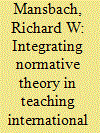

|
|
|
|
|
| Publication |
2012.
|
| Summary/Abstract |
This essay outlines the ways in which the author presents normative theory to his students in his courses and textbook in international relations.
|
|
|
|
|
|
|
|
|
|
|
|
|
|
|
|
| 3 |
ID:
113742
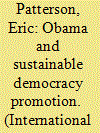

|
|
|
|
|
| Publication |
2012.
|
| Summary/Abstract |
Barack Obama consistently has called upon the US to support what he calls "sustainable democracy." Such a commitment to promoting democracy abroad is a common theme among postwar American presidents, but often there are disconnects between America's ideals and interests as well as between the rhetoric and actual concrete action. This paper introduces democracy promotion activities in recent US history, then turns to the words and deeds of candidate and now, President Obama and his administration. In short, the Obama administration's first year in office has been marked by grand rhetoric, general continuity with the previous administration in democracy funding, but a lack of policy coherence and leadership on these issues. The paper concludes with a series of lessons and recommendations for the Obama administration on sustaining democracy worldwide gleaned from the shortcomings of the Bush administration.
|
|
|
|
|
|
|
|
|
|
|
|
|
|
|
|
| 4 |
ID:
113743


|
|
|
|
|
| Publication |
2012.
|
| Summary/Abstract |
Expectations that the presidential transition from George W. Bush to Barack Obama would produce a multilateralist turn in American foreign policy have thus far proven misplaced. This is largely because the strategic environment of the post-Cold War era places structural constraints on the ability of any US president, of whatever ideological leanings, to pursue a consistently multilateralist foreign policy. Internationally, the absence of a shared great power threat has undermined the institutional bargain between the United States and allied states, thus rendering the terms of multilateral cooperation more difficult to agree upon. At home, the end of the Cold War has undermined presidential authority and empowered veto players whose interests are threatened by multilateral commitments. Nevertheless, structure is not destiny. Understanding the sources of political constraint can suggest strategies for overcoming or bypassing such obstacles to multilateral engagement in US foreign policy. A president who wishes to exercise multilateral leadership abroad must seek to renegotiate the terms of US engagement with international institutions while fashioning a compelling rationale that mobilizes public support at home.
|
|
|
|
|
|
|
|
|
|
|
|
|
|
|
|
| 5 |
ID:
113737


|
|
|
|
|
| Publication |
2012.
|
| Summary/Abstract |
There is an ethical imperative to analyze the ethical issues built into every aspect of the discipline of IR. Also, the "Ethics of IR"? is not a sub-discipline of IR, but is core to the whole discipline.
|
|
|
|
|
|
|
|
|
|
|
|
|
|
|
|
| 6 |
ID:
113739


|
|
|
|
|
| Publication |
2012.
|
| Summary/Abstract |
It seems that everyone is in favor of teaching "ethics."? However, too often ethics-or at least what passes itself off as such-is overly narrow in scope, self-serving, premised on empirical error, and subject to change simply based on location. Thus, the fear is that teaching ethics can itself be unethical.
|
|
|
|
|
|
|
|
|
|
|
|
|
|
|
|
| 7 |
ID:
113744
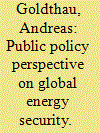

|
|
|
|
|
| Publication |
2012.
|
| Summary/Abstract |
Despite an emerging literature on global energy governance, there so far is no extensive intellectual rationale for it. This article seeks to fill this gap by putting forward a public policy framework to analyze global energy. With that lens, energy security relates to problems of market failure at a transnational scale. These may occur due to imperfect competition; negative externalities; lack of information; or the presence of public goods. It is argued that major global energy risks such as oil price volatility, lack of transport infrastructure, and insufficient upstream investments can be convincingly conceptionalized as markets failing to provide for a crucial good-energy security. This article thus proposes market failure as an analytical justification of and as an intellectual foundation for further research in global energy governance, and sketches possible research agendas in that field.
|
|
|
|
|
|
|
|
|
|
|
|
|
|
|
|
| 8 |
ID:
113741


|
|
|
|
|
| Publication |
2012.
|
| Summary/Abstract |
This article offers the reflections of a civilian instructor in ethics after 20 years of teaching at the United States Naval Academy in Annapolis. It describes his efforts to provide the midshipmen in his classes a realistic, practical, yet very demanding preview of the ethical challenges they will face once they are officers deployed to the fleet.
|
|
|
|
|
|
|
|
|
|
|
|
|
|
|
|
| 9 |
ID:
113736
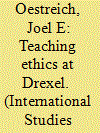

|
|
|
|
|
| Publication |
2012.
|
| Summary/Abstract |
Although international politics is an area resistant to moral thinking, this paper argues that it is important to ground students in the basics of international ethics. This is true because some of them will become international affairs professionals; but all will be citizens who need the tools to think critically about their nation's foreign policies. Also, ethical thinking provides a very good way to critique mainstream theories of world politics, by calling into question some of their basic tenets, particularly when these are defended as "rational" and thus beyond criticism. Most textbooks, however, pay too little attention to these problems. A few ways to overcome these shortcomings are suggested.
|
|
|
|
|
|
|
|
|
|
|
|
|
|
|
|
| 10 |
ID:
113740
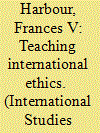

|
|
|
|
|
| Publication |
2012.
|
| Summary/Abstract |
There are important differences between 1985 and today in the way we think about the subject of international ethics as political scientists, the resources we have available for students, and in the attitudes of students toward ethical issues. This paper compares the experience of teaching international ethics in 1985 with teaching the same course in the twenty-first century. The current environment is more accepting of international ethics as a field of academic inquiry, and much richer in terms of resources.
|
|
|
|
|
|
|
|
|
|
|
|
|
|
|
|
| 11 |
ID:
113745
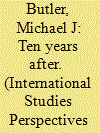

|
|
|
|
|
| Publication |
2012.
|
| Summary/Abstract |
A decade after achieving independence, the Democratic Republic of Timor-Leste (DRTL) continues to rely upon the United Nations (UN) directly and indirectly to carry out functions typically ascribed to the state. This dependency raises the specter of what scholars concerned with the breadth and extent of recent and ongoing UN operations in places such as Timor-Leste have dubbed "neo-trusteeship." This research advances an empirical accounting of, and explanation for, the emergence and persistence of neo-trusteeship in Timor-Leste. Careful scrutiny of the UN involvement in Timor-Leste betrays the origins and sources of the neo-trusteeship arrangement and suggests that neo-trusteeship is better understood as a by-product of the disjuncture between mandate overreach and organizational incapacity playing out within complex post-conflict environments rather than any intentional manifestation of "post-modern imperialism."
|
|
|
|
|
|
|
|
|
|
|
|
|
|
|
|